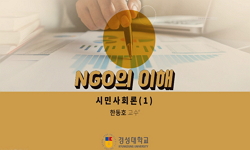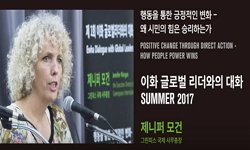This paper examines the influence of environmental NGOs in the EU’s climate change policy-making. The EU’s climate change policy has shifted rather dramatically by the adoption of the EU Emissions Trading Directive in 2003 if one recalls that the ...
http://chineseinput.net/에서 pinyin(병음)방식으로 중국어를 변환할 수 있습니다.
변환된 중국어를 복사하여 사용하시면 됩니다.
- 中文 을 입력하시려면 zhongwen을 입력하시고 space를누르시면됩니다.
- 北京 을 입력하시려면 beijing을 입력하시고 space를 누르시면 됩니다.
부가정보
다국어 초록 (Multilingual Abstract)
This paper examines the influence of environmental NGOs in the EU’s climate change policy-making. The EU’s climate change policy has shifted rather dramatically by the adoption of the EU Emissions Trading Directive in 2003 if one recalls that the EU was a leading opponent to the emissions trading up to the 1997 Kyoto Conference. Unlike conventional wisdom in the literature on NGO politics, the European environmental NGOs were neither influential nor coherent throughout this process. Environmental NGOs working in the EU’s climate change policy network were not only unable to imprint their objection to the emissions trading onto the policy outcome, but co-opted by the new policy paradigm of the EU. The cooptation of environmental NGOs, I contend, can be explained by the trade-off between political opportunity and issue-framing capability that NGOs experience when actively participating in the policy network. The participation in the policy network can provide NGOs with ample ground for enhancing policy influence, but may degenerate them into advisory assistants unless it is accompanied by the issue-framing capability. With the participation in the various formal and informal policy networks of the EU, the environmental NGOs were able to maximize their political opportunity, but only at the expense of their issueframing capability. The advisory trap of this kind, I argue, was the underlying force behind the cooptation of environmental NGOs within the EU ETS.
참고문헌 (Reference)
1 Carbon Trade Watch, "The Sky is not the Limit: The Emerging Market in Greenhouse Gases"
2 Christiansen, Atle C., "The Role of Flexibility Mechanisms in EU Climate Strategy: Lessons Learned and Future Challenges?" 4 (4): 27-46, 2004
3 Gough, Clair, "The Respectable Politics of Climate Change: The Epistemic Communities and NGOs" 77 (77): 329-345, 2001
4 Arts, Bas, "The Political Influence of Global NGOs: Case Studies on the Climate and Biodiversity Conventions" International Books 1998
5 Skjaerseth, Jon, "The Origin, Evolution and Consequences of the EU Emissions Trading System" 9 (9): 101-122, 2008
6 Wettestad, Jørgen, "The Making of the 2003 EU Emissions Trading Directive: An Ultra-Quick Process due to Entrepreneurial Proficiency?" 5 (5): 1-23, 2003
7 Chartier, Denis, "The International Environmental NGOs: From the Revolutionary Alternatives to the Pragmatism of Reform" 7 (7): 26-41, 1998
8 Raustiala, Kal, "States, NGOs and International Environmental Institutions" 41 (41): 719-740, 1997
9 Wapner, Paul, "Politics Beyond the State: Environmental Activism and World Civic Politics" 47 (47): 411-440, 1995
10 Knoke, David, "Political networks: The Structural Perspective" Cambridge University Press 1990
1 Carbon Trade Watch, "The Sky is not the Limit: The Emerging Market in Greenhouse Gases"
2 Christiansen, Atle C., "The Role of Flexibility Mechanisms in EU Climate Strategy: Lessons Learned and Future Challenges?" 4 (4): 27-46, 2004
3 Gough, Clair, "The Respectable Politics of Climate Change: The Epistemic Communities and NGOs" 77 (77): 329-345, 2001
4 Arts, Bas, "The Political Influence of Global NGOs: Case Studies on the Climate and Biodiversity Conventions" International Books 1998
5 Skjaerseth, Jon, "The Origin, Evolution and Consequences of the EU Emissions Trading System" 9 (9): 101-122, 2008
6 Wettestad, Jørgen, "The Making of the 2003 EU Emissions Trading Directive: An Ultra-Quick Process due to Entrepreneurial Proficiency?" 5 (5): 1-23, 2003
7 Chartier, Denis, "The International Environmental NGOs: From the Revolutionary Alternatives to the Pragmatism of Reform" 7 (7): 26-41, 1998
8 Raustiala, Kal, "States, NGOs and International Environmental Institutions" 41 (41): 719-740, 1997
9 Wapner, Paul, "Politics Beyond the State: Environmental Activism and World Civic Politics" 47 (47): 411-440, 1995
10 Knoke, David, "Political networks: The Structural Perspective" Cambridge University Press 1990
11 Bomberg, Elizabeth, "Policy Learning in an Enlarged European Union: Environmental NGOs and New Policy Instrument" 14 (14): 248-268, 2007
12 Mintrom, Michael, "Policy Entrepreneurs and the Diffusion of Information" 41 (41): 738-770, 1997
13 Woerdmann, Edwin, "Path-Dependent Climate Policy: the History and Future of Emissions Trading in Europe" 14 (14): 261-275, 2004
14 Convery, Frank J., "Origins and Development of the EU ETS" 43 (43): 391-412, 2009
15 Cass, Loren, "Norm Entrapment and Preference Change: The Evolution of the European Union Position on International Emissions Trading" 5 (5): 38-60, 2005
16 Heins, Volker, "Nongovernmental Organizations in International Society: Struggles over Recognition" Palgrave Macmillan 2008
17 Clark, Ann Marie, "Non-Governmental Organizations and the Influence on International Society" 48 (48): 507-525, 1995
18 Gordenker, Leon, "NGOs, the UN and Global Governance" Lynne Rienner 1996
19 Young, Zoe, "NGOs and the Global Environmental Facility: Friendly Foes?" 8 (8): 243-267, 1999
20 Jasanoff, Sheila, "NGOs and the Environment: From Knowledge to Action" 18 (18): 579-594, 1997
21 Gulbrandsen, Lars H., "NGO Influence in the Implementation of the Kyoto Protocol: Compliance, Flexibility Mechanisms, and Sinks" 4 (4): 54-75, 2004
22 Betsill, Michele M., "NGO Influence in International Environmental Negotiations: A Framework for Analysis" 1 (1): 65-85, 2001
23 Schreurs, Miranda A., "Multi-Level Reinforcement: Explaining European Union Leadership in Climate Change Mitigation" 7 (7): 19-46, 2007
24 Risse, Thomas, "Let’s Argue: Communicative Action in World Politics" 54 (54): 1-39, 2000
25 Haas, Peter, "Introduction: Epistemic Communities and International Policy Coordination" 46 (46): 1-35, 1992
26 Eising, Rainer, "Institutional Context, Organizational Resources and Strategic Choices" 8 (8): 329-362, 2007
27 Michaelowa, Axel, "Impact of Interest Groups on EU Climate Policy" 8 (8): 152-160, 1998
28 Snow, David A., "Frame Alignment Processes, Micromobilization, and Movement Participation" 51 (51): 464-481, 1986
29 Thomas, Daniel C., "Explaining the Negotiation of EU Foreign Policy: Normative Institutionalism and Alternative Approaches" 46 (46): 339-357, 2009
30 Hallstrom, Lars K., "Eurocratising Enlargement? EU Elites and NGO Participation in European Environmental Policy" 13 (13): 175-193, 2004
31 Princen, Thomas, "Environmental NGOs in World Politics: Linking the Local and the Global" Routledge 1994
32 Biliouri, Daphne, "Environmental NGOs in Brussels: How Powerful Are Their Lobbying Activities?" 8 (8): 173-182, 1999
33 Oberthür, Sebastian, "EU Leadership in International Climate Policy: Achievements and Challenges" 43 (43): 35-50, 2008
34 McAdam, Douglas, "Conceptual Origins, Current Problems, Future Directions, In Comparative Perspectives on Social Movements: Political Opportunities, Mobilizing Structures, and Cultural Framings" Cambridge University Press 23-40, 1999
35 Newell, Peter, "Climate for Change: Non-State Actors and the Global Politics of the Greenhouse" Cambridge University Press 2000
36 Vogler, John, "Climate Change and EU Foreign Policy: the Negotiation of Burden Sharing" 46 (46): 469-490, 2009
37 Ford, Lucy H., "Challenging Global Environmental Governance: Social Movement Agency and Global Civil Society" 3 (3): 120-134, 2003
38 Peters, Guy, "Agenda-setting in the European Community" 1 (1): 9-26, 1994
39 Keck, Margaret E., "Activists Beyond Borders: Advocay Networks in International Politics" Cornell University Press 1998
동일학술지(권/호) 다른 논문
-
국제금융위기가 한국 조선 산업의 대 EU 교역에 미치는 효과
- 한국유럽학회
- 김미아
- 2012
- KCI등재
-
ASEAN+3's Lessons from EU Integration
- 한국유럽학회
- 이재득
- 2012
- KCI등재
-
- 한국유럽학회
- 안상욱
- 2012
- KCI등재
-
유럽재정위기로 인한 유로 존 주식시장의 충격에 관한 연구
- 한국유럽학회
- 김연준
- 2012
- KCI등재
분석정보
인용정보 인용지수 설명보기
학술지 이력
| 연월일 | 이력구분 | 이력상세 | 등재구분 |
|---|---|---|---|
| 2027 | 평가예정 | 재인증평가 신청대상 (재인증) | |
| 2021-01-01 | 평가 | 등재학술지 유지 (재인증) |  |
| 2018-01-01 | 평가 | 등재학술지 유지 (등재유지) |  |
| 2015-01-01 | 평가 | 등재학술지 유지 (등재유지) |  |
| 2011-01-01 | 평가 | 등재학술지 유지 (등재유지) |  |
| 2009-01-01 | 평가 | 등재학술지 유지 (등재유지) |  |
| 2006-01-01 | 평가 | 등재학술지 선정 (등재후보2차) |  |
| 2005-01-01 | 평가 | 등재후보 1차 PASS (등재후보1차) |  |
| 2004-01-01 | 평가 | 등재후보학술지 유지 (등재후보1차) |  |
| 2003-01-01 | 평가 | 등재후보학술지 선정 (신규평가) |  |
학술지 인용정보
| 기준연도 | WOS-KCI 통합IF(2년) | KCIF(2년) | KCIF(3년) |
|---|---|---|---|
| 2016 | 0.32 | 0.32 | 0.41 |
| KCIF(4년) | KCIF(5년) | 중심성지수(3년) | 즉시성지수 |
| 0.43 | 0.42 | 0.639 | 0.14 |




 KCI
KCI






